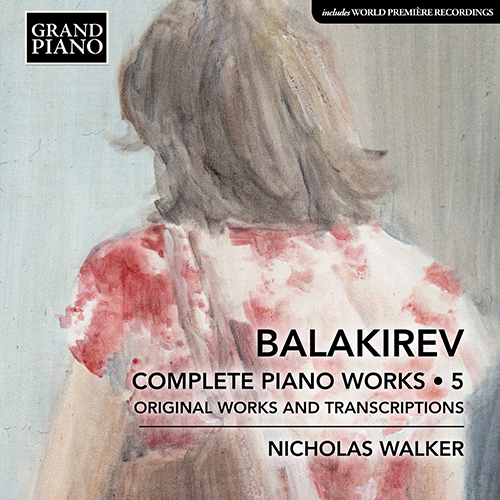
About this Release
“This fifth volume also includes previously unpublished and unrecorded work: Balakirev’s arrangement of Chernomor’s March from Glinka’s Ruslan i Ludmila and the charming Polonaise Brillante, written when the composer was only 16. There are also Balakirev’s exciting codas to Chopin’s Scherzo No. 2 and Liszt’s Mazurka Brillante, which I especially enjoyed playing: the Chopin Scherzo somehow seems grander and even more substantial. In addition there are a number of beautiful and often quite spectacular arrangements and original works, even including portrayals of snow and balalaikas in his Fantasy on Glinka’s “A Life for the Czar” which transports the listener into a Russian winter. In fact, as with all Balakirev’s output, one loves it more, and sees more in it, the more one listens.” — Nicholas Walker
BALAKIREV, MILI ALEKSEYEVICH (1837–1910)
Complete Piano Works • 5
Original Works and Transcriptions
- Nicholas Walker, piano
Balakirev’s appreciation of other composers is reflected in transcriptions that also reveal his brilliance as a pianist. With several world premiere recordings, this programme includes the marvellous balalaika sonorities and virtuoso colours to be found in operas by Glinka, the novel concept of dovetailing préludes by Chopin, and the richness of Beethoven’s string quartets. A plaintive Gondola Song, the relentlessly energetic Tarantelle and the Polonaise brillante conclude this fifth volume in Nicholas Walker’s acclaimed complete edition of his piano works.
This recording was made on a modern instrument: Steinway, Model D
Tracklist
|
Balakirev, Mily Alexeyevich
|
|
1
Réminiscences de l'opéra La vie pour le czar (1899) (00:11:54)
|
|
Glinka, Mikhail Ivanovich
|
|
2
Ruslan i Lyudmila: Chernomor's march (arr. M.A. Balakirev for piano) (1890) * (00:04:19)
|
|
Chopin, Fryderyk
|
|
3
Piano Concerto No. 1 in E Minor, Op. 11: II. Romanza: Larghetto (arr. M.A. Balakirev for piano) (1830) (00:08:06)
|
|
Balakirev, Mily Alexeyevich
|
|
4
Impromptu (after Chopin's Préludes) (1907) (00:04:57)
|
|
Chopin, Fryderyk
|
|
5
Scherzo No. 2 in B-Flat Minor, Op. 31 (cadenza by M.A. Balakirev) (1837) * (00:10:40)
|
|
Liszt, Franz
|
|
6
Mazurka brillante, S221/R43 (1850) (00:04:48)
|
|
7
Mazurka brillante, S221/R43 (cadenza by M.A. Balakirev) (1850) * (00:04:56)
|
|
Beethoven, Ludwig van
|
|
8
String Quartet No. 8 in E Minor, Op. 59, No. 2, "Rasumovsky": III. Allegretto (arr. M.A. Balakirev for piano) (1862) (00:06:52)
|
|
9
String Quartet No. 13 in B-Flat Major, Op. 130: V. Cavatina (arr. M.A. Balakirev for piano) (1859) (00:05:52)
|
|
Balakirev, Mily Alexeyevich
|
|
10
Gondellied in A Minor () (00:06:43)
|
|
11
Tarantella in B Major (1901) (00:05:54)
|
|
12
Polonaise Brillante () * (00:03:11)
|
The Artist(s)
The Composer(s)
 A brilliant pianist, improviser, noted conductor and selfless champion of other composers, Balakirev is surprisingly little known today. Yet as leader of the Russian composers known as ‘The Mighty Handful’, Rimsky-Korsakov, Mussorgsky, Borodin and Cui, he strongly influenced not only their work but also that of Tchaikovsky, Debussy, Ravel and Stravinsky, setting the standard by which others were judged. In addition to a large output of piano music and songs, Balakirev wrote two symphonies, several symphonic poems, works for piano and orchestra, choral music and incidental music for Shakespeare’s King Lear.
A brilliant pianist, improviser, noted conductor and selfless champion of other composers, Balakirev is surprisingly little known today. Yet as leader of the Russian composers known as ‘The Mighty Handful’, Rimsky-Korsakov, Mussorgsky, Borodin and Cui, he strongly influenced not only their work but also that of Tchaikovsky, Debussy, Ravel and Stravinsky, setting the standard by which others were judged. In addition to a large output of piano music and songs, Balakirev wrote two symphonies, several symphonic poems, works for piano and orchestra, choral music and incidental music for Shakespeare’s King Lear.  Beethoven did much to enlarge the possibilities of music and widen the horizons of later generations of composers.
Beethoven did much to enlarge the possibilities of music and widen the horizons of later generations of composers.  Glinka is commonly regarded as the founder of Russian nationalism in music. His influence on Balakirev, self-appointed leader of the later group of five nationalist composers, was considerable. As a child he had some lessons from the Irish pianist John Field, but his association with music remained purely amateur until visits to Italy and in 1833 to Berlin allowed concentrated study and subsequently a greater degree of assurance in his composition, which won serious attention both at home and abroad. His Russian operas offered a synthesis of Western operatic form with Russian melody, while his orchestral music, with skillful instrumentation, offered a combination of the traditional and the exotic. Glinka died in Berlin in 1857.
Glinka is commonly regarded as the founder of Russian nationalism in music. His influence on Balakirev, self-appointed leader of the later group of five nationalist composers, was considerable. As a child he had some lessons from the Irish pianist John Field, but his association with music remained purely amateur until visits to Italy and in 1833 to Berlin allowed concentrated study and subsequently a greater degree of assurance in his composition, which won serious attention both at home and abroad. His Russian operas offered a synthesis of Western operatic form with Russian melody, while his orchestral music, with skillful instrumentation, offered a combination of the traditional and the exotic. Glinka died in Berlin in 1857. Reviews
“Nicholas Walker has the measure of Balakirev’s style and certainly the technique to tackle the extraordinary demands Balakirev places on his performers” – MusicWeb International
“Walker’s playing throughout this absorbing disc is a pleasure to hear, with a sophisticated tonal palette and eschewing any superficial virtuosity: ‘bravura with integrity’ is how I would describe it.” – Gramophone


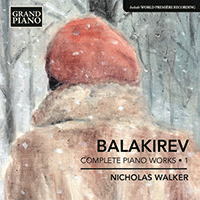
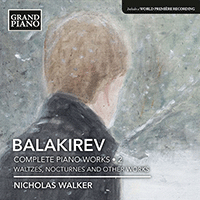
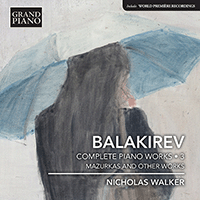
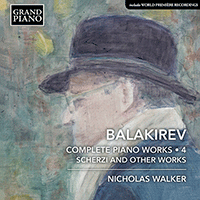
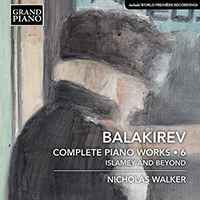
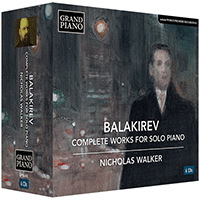
 Grand Piano has gained a reputation for producing high quality recordings of rare keyboard gems. Dedicated to the exploration of undiscovered piano repertoire, the label specialises in complete cycles of piano works by many lesser-known composers, whose output might otherwise have remained unknown and unrecorded.
Grand Piano has gained a reputation for producing high quality recordings of rare keyboard gems. Dedicated to the exploration of undiscovered piano repertoire, the label specialises in complete cycles of piano works by many lesser-known composers, whose output might otherwise have remained unknown and unrecorded.






